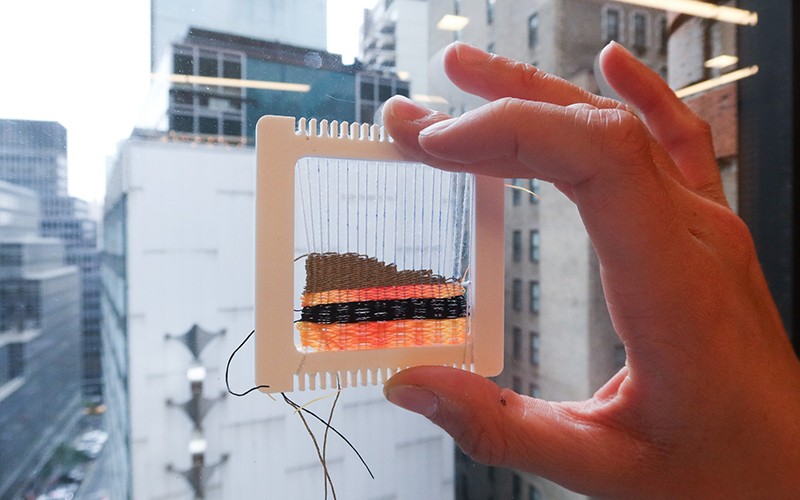Primary tabs

Last month, as both New York Textile Month and Climate Week NYC drew to a close, the Hybrid Body Lab (HBL) led a sustainable e-textile workshop in Manhattan. The event took place at 570 Lexington Avenue, Cornell’s midtown hub for research, learning and engagement.
Participants learned to make EcoThreads, or biodegradable and conductive yarns, using a wet spinning process with materials sourced from the grocery store. Participants included current or retired faculty from New York City-area design schools, individual textile artists, creative technologists and multidisciplinary designers and consultants exploring textiles and materials.
“New York City has a large population of emerging e-textile practitioners,” said Cindy Hsin-Liu Kao, HBL director and assistant professor of Human Centered Design. “Given the enthusiastic response we received to this workshop, we look forward to future, further community-building efforts in which we can engage a wider range of soft interface creatives in NYC to rethink our lifecycle and approaches towards sustainable prototyping."
EcoThreads are a sustainable option for the fast-growing e-textile industry, which is expected to reach a market size of $1.3 billion in the next eight years. The biodegradable yarns can be woven, knit, crocheted or otherwise manipulated into e-textiles. EcoThreads were created by the multidisciplinary HBL team for use when e-textiles do not require a long lifespan – such as during the rapid prototyping phase.

Participants manufacture thermochromic (color changing due to temperature) biodegradable threads.
“During this workshop, we focused on the materiality of EcoThreads,” said Jingwen Zhu, a Human Centered Design Ph.D. candidate and Hybrid Body Lab member, who led the workshop. “Biomaterials for sustainable e-textiles are still new and not yet well-researched. I was pleased with how eager participants were to innovate and adapt the threads into their own practice.”
During the workshop, participants gained hands-on experience learning how to make EcoThreads from accessible materials. They fabricated their own swatches using knitting, weaving or embroidery tools. Finally, they shared their collective experience in a brainstorming discussion, envisioning how this approach would be adapted to existing textile practices, maker culture and education curriculum.
“This was a very autonomous group,” said Zhu. “Participants were eager to expand beyond the use cases that I showcased, and explored new affordances for the material, including quickly adapting sensors and adjusting coding and debugging.”
The emphasis was experimentation and creative exploration, focusing on how to leverage the unique materiality of these sustainable yarns for various textile integration. In interviews after the workshop, many participants reported using EcoThreads in their individual practices.
“These yarns have so much potential,” said Whitney Crutchfield, assistant professor at FIT and textile artist who shared her EcoThread swatches with students at FIT. “Our students are asking how they can action their concerns around the environment and sustainability. EcoThreads offers a way to introduce those principles into their work.”
The workshop was sponsored by a grant from the Cornell Atkinson Center for Sustainability Academic Venture Fund & Knowledge to Impact Award, the College of Human Ecology Faculty Sustainability Research Grant and Engaged Research Grant and the CCSS QuIRI Small Grants Program.